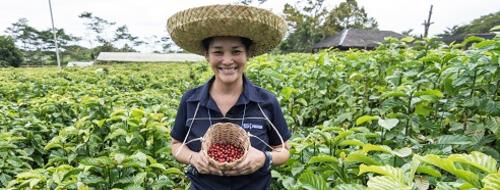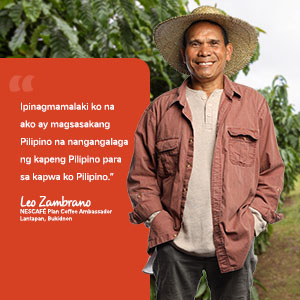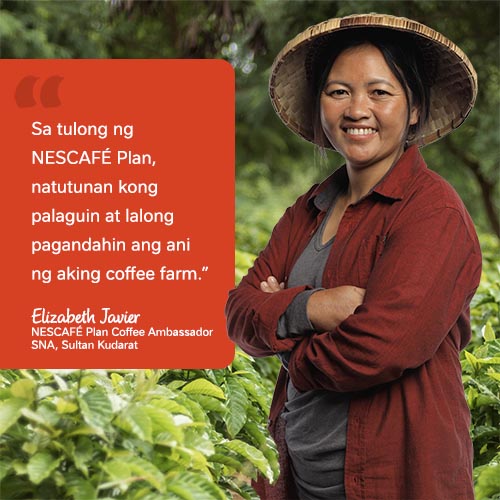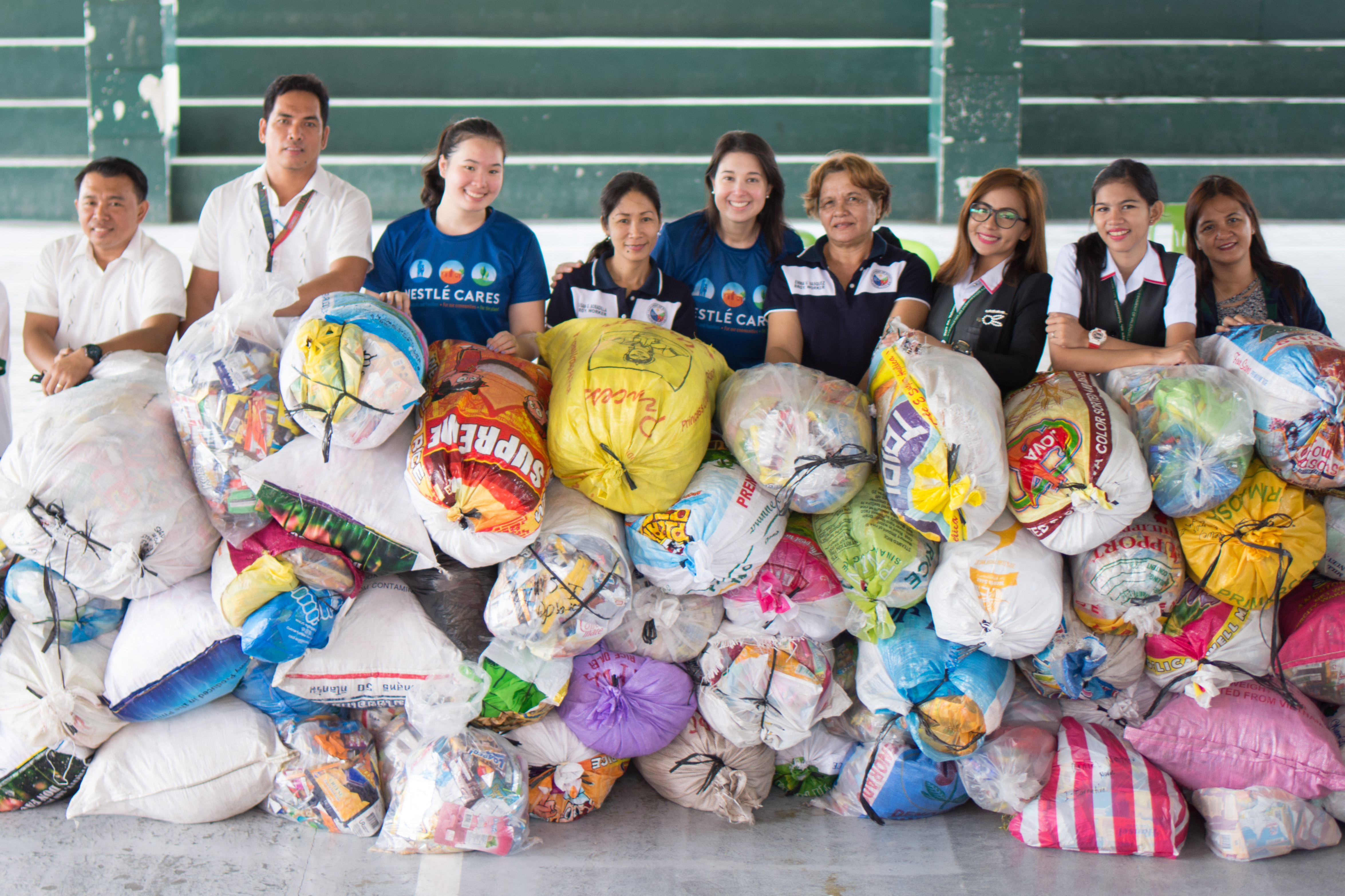As one of the world’s biggest buyers of green coffee, NESCAFÉ is committed to helping coffee farmers improve the quantity and quality of their coffee yield in a manner that is sustainable for the long-term, and profitable to both the farmers and Nestlé. NESCAFÉ’s long-standing partnership with Filipino coffee farmers demonstrates the very essence of a fundamental business strategy that Nestlé calls Creating Shared Value (CSV).
The NESCAFÉ Plan aims to:
- Make coffee farming a more sustainable livelihood by helping supplier farmers meet established sustainability standards, optimizing productivity through advanced farm management techniques called the NESCAFÉ Better Farming Practices;
- Achieve the smallest environmental footprint in all coffee product categories where the brand is active (soluble coffee, multi-beverage systems, and ready-to-drink beverages);
- Promote more sustainable consumer behavior, the adoption of more sustainable preparation methods, and the re-use of packaging;
- Benefit society more broadly by continuing to invest in the areas of coffee research, factories, and employment; and
- Assure continued supply of high-quality green coffee beans for Nestlé.
Government Support
Nestlé’s efforts at helping coffee farmers has been recognized by the Philippine government. In 2010, the government discussed the conversion of portions of its research stations into Robusta coffee plantlet farm schools, which would share knowledge on researches regarding coffee technology. Nestlé took this opportunity to link arms with government and has since entered into formal agreements where it commits itself to provide training and technical assistance to government agronomists and in support of the government’s coffee-boosting programs, as well as the propagation of the Robusta coffee plantlets.
Technical Assistance
Long before the advent of the NESCAFÉ Plan, Nestlé Philippines, Inc. had already been actively helping local coffee farmers improve both the quality and quantity of their yield through Nestlé’s agricultural program and continues to do so today. The program started in the 1960s when Nestlé opened its first NESCAFÉ manufacturing plant in Alabang, Muntinlupa. Then as now, the foremost objective is to equip coffee farmers with the best available technologies and techniques to enable them to increase their harvest per hectare and improve the quality of their coffee.
At the heart of the program are our Integrated Coffee Centers where we showcase the NESCAFÉ Plan and train coffee farmers with the latest technology on coffee production. Our Bukidnon Integrated Coffee Center (BICC) is equipped with the following facilities:
- Training Center
- Mother Plant Garden
- Plantlet Nursery
- Composting and Vermi-composting Facilities
- Experimental and Demo Farm
- Intercropping Models
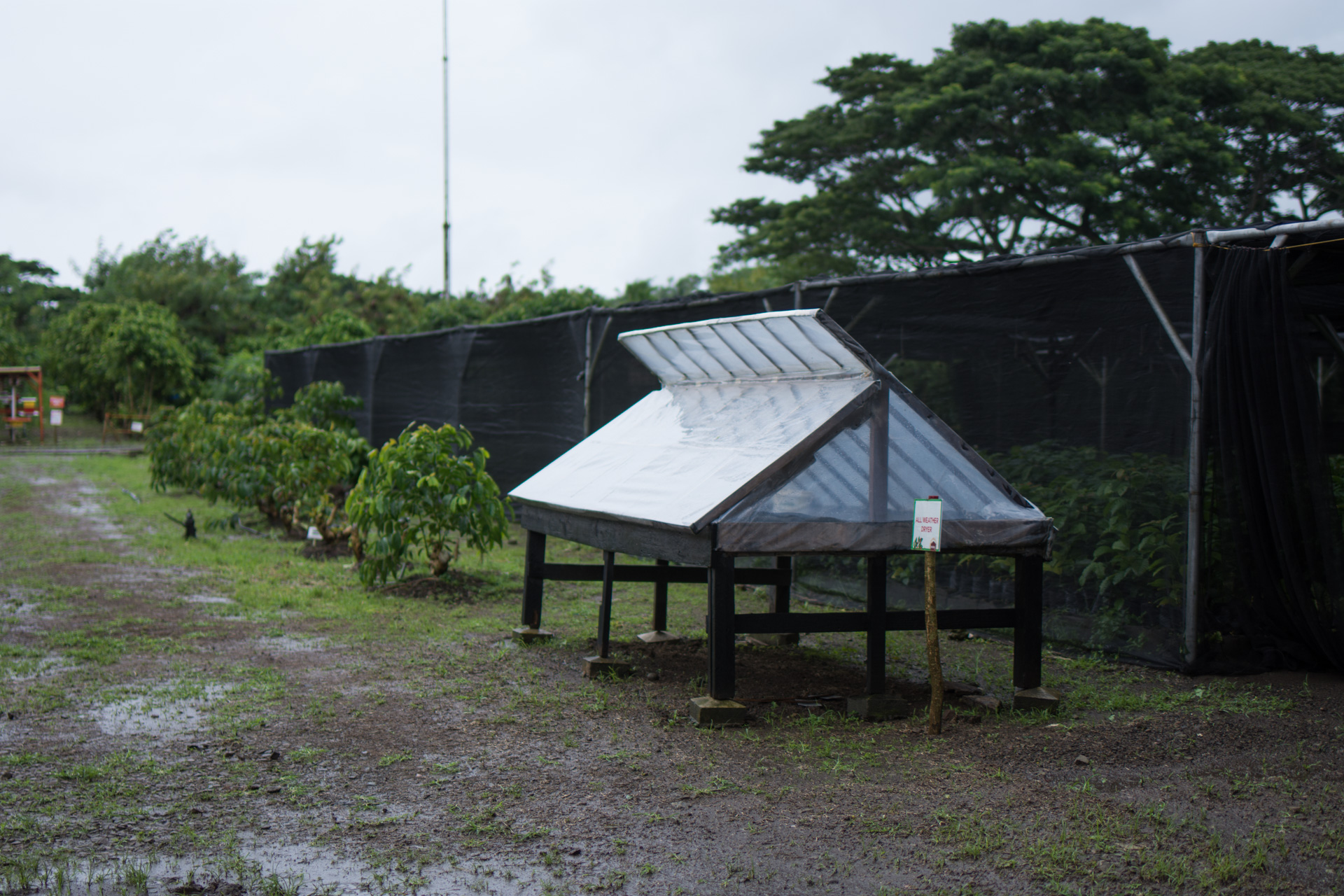
Local Coffee Procurement and Transparent Coffee Buying
In 2019, we updated the criteria for our local procurement of coffee beans while preserving the quality of our NESCAFÉ brand. Farmers selling coffee beans to Nestlé Philippines have said the new criteria has made it easier for them to sell their produce. The workload of farmers likewise has been reduced, particularly in harvesting, drying, and sorting produce.
Seasonal buying stations are opened in Tacurong and Maramag and Bukidnon, both located in Mindanao, to make it easier for farmers in the region to sell to Nestlé. The buying station in the Nestlé Cagayan de Oro factory is open year-round. We have also utilized technological tools to aid in the coffee buying process. Farmers are updated with prices regularly through text messages and a same day payment scheme has been put in place to ensure smooth and transparent engagements with our coffee farmers.
Project Coffee+
As a banner component of the NESCAFÉ Plan, in 2018 Nestlé Philippines launched Project Coffee+ in Mindanao with the objective of increasing the yield of participating coffee farmers to one metric ton per hectare over a period of three years (2018 – 2020), thereby increasing their income and the economic viability of their farming systems. Under Project Coffee+ some 1,500 farmers (980 in the province of Sultan Kudarat and 520 in the province of Bukidnon) are undergoing training, mainly in agronomic practices such as grafting, pruning, rejuvenation, and organic and inorganic fertilization.
Along with its partner GIZ (Deutsche Gesellschaft für Internationale Zusammenarbeit GmbH, or the German Corporation for international Cooperation GmbH), Nestlé aims to transform the farmers into agripreneurs using the Farmer Business School tool and to engage government and other stakeholders who can fill the gaps in the coffee value chain.
Mindanao produces more than 70 percent of the country’s annual coffee output. In fact, Sultan Kudarat alone produced more than 19,000 metric tons in 2011. The economy of the province is predominantly agricultural. With vast agricultural potential, Sultan Kudarat’s output consists of practically all types of crops grown in the country, including rice, corn, coffee and vegetables. Two of its municipalities, Lebak and Kalamansig, are among the country’s major coffee producers.
Bukidnon, predominantly a rolling grassland plateau with its large areas boasting soils and climate highly suited to agriculture, is considered the region’s “food basket.” In the early 1980s, Bukidnon was recognized as the coffee province because of its world-class coffee beans. With its high potential, the province is once again gaining recognition as an important player in coffee farming.
Growing Robusta coffee has the potential to increase livelihood opportunities for Mindanao’s farmers, including smallholder coffee growers in conflict-affected areas.
